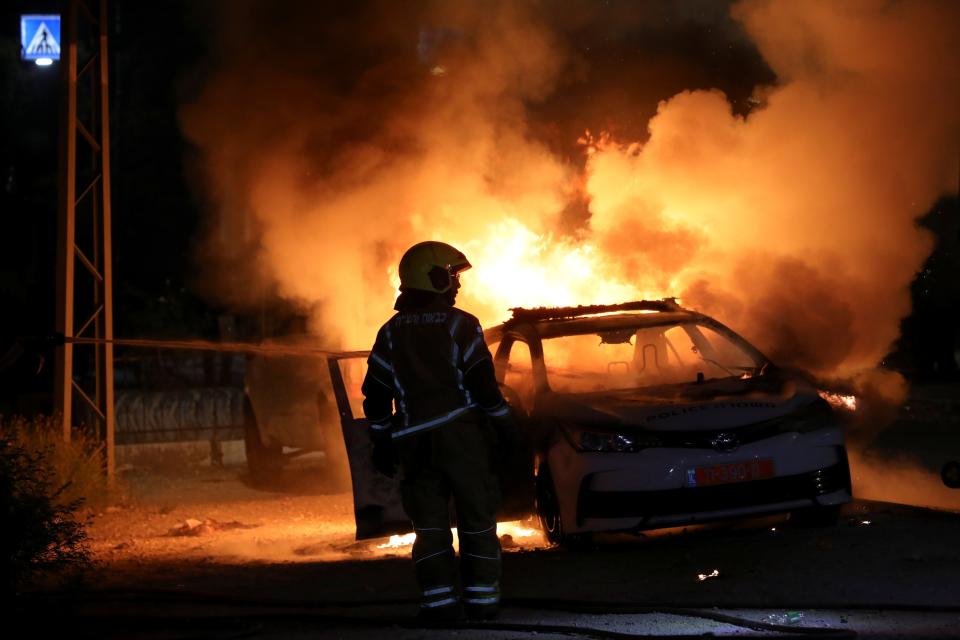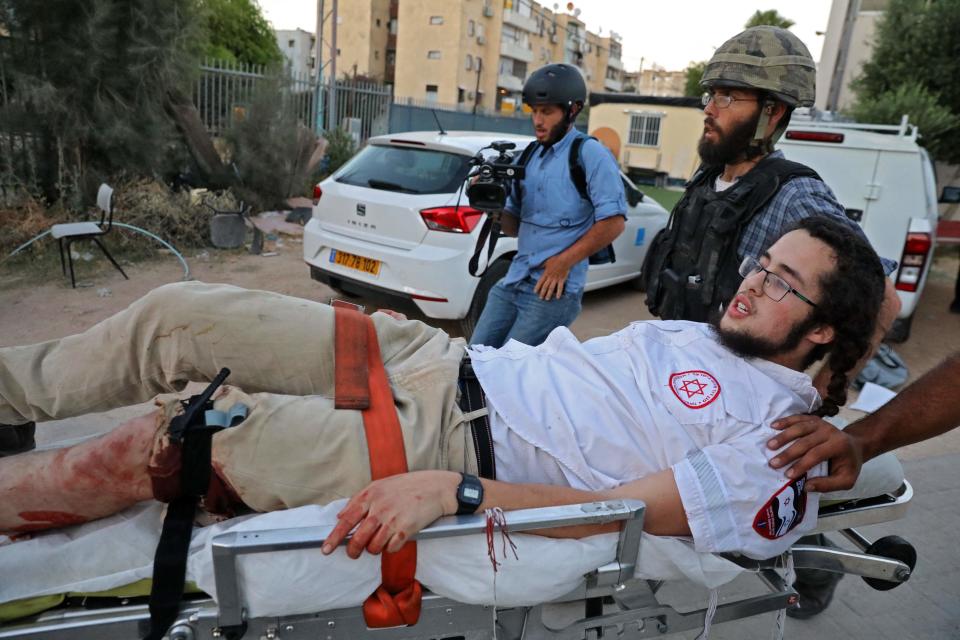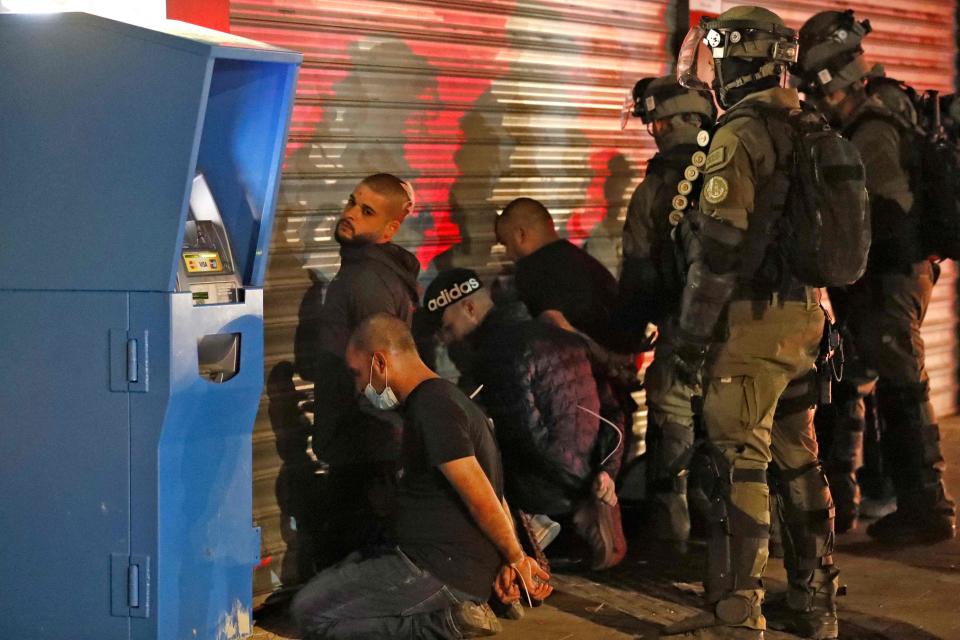‘This feels like civil war’: Israel’s mixed cities become the new front line

An Israeli firefighter by a burning police car in Lod
(Reuters)Only the haunting wail of the rocket sirens that force everyone to dive for cover pauses the violence that snarls through Lod, in southern Israel.
At sundown, the bitterly divided Arab-Jewish city teeters on a knife’s edge, separate to the brewing war between Gaza and the Israeli army just 40km away.
The rocket barrages that rain down appear only a distraction from the real battle on the ground between Palestinian and Jewish residents of the area.
Driving around Lod, or al-Lydd in Arabic, fires blaze across streets that are partly blocked by dumpsters and torched, upturned cars.
“This feels like civil war,” says Ayoub Hassuna, 27, whose brother Mussa, 31, was shot dead, likely by Jewish residents, during a wave of violence on Monday.
“I want justice for my brother, but how? We feel like we are in a jungle. We don’t know who is against us or for us here.”
What is unfolding in Lod, reflects the absence of inter-communal bonds across Israel.
Against the backdrop of a potential protracted war in Gaza, and clashes between settlers and Arabs in Jerusalem, violence has flared between Jewish-Israeli and Arab-Palestinian citizens of Israel.
The bitter war within a war that is brewing threatens to fracture the country further, whether or not a ceasefire silences the warplanes growling over Gaza or the rocket launchers firing back.
The violence has become so serious that even as the Israeli army is drawing up plans for a potential ground invasion of Gaza, the Israeli prime minister, Benjamin Netanyahu, announced this week that vital military resources may be diverted to quell the unrest in the country’s own cities.

The president, Reuven Rivlin, has warned of a civil war, appealing to all sides to “please stop this madness”.
Israel’s estimated 1.9 million Arabs make up about 20 per cent of the population and mainly comprise of descendants of Palestinians who either stayed within their communities or were internally displaced after the 1948 war that led to the creation of Israel.
For years they have complained of discrimination, structural racism and violence from Jewish citizens as well as leaders and security forces. Officials often deny that discrimation exists.
Across the country, tensions reached boiling point over the weekend following scenes of Israeli forces repeatedly storming Jerusalem’s al-Aqsa mosque, the third holiest site in Islam, with stun grenades and teargas, while Palestinian protesters threw back rocks and bottles.
The cross-border exchange of fire between Hamas and Israel that erupted shortly afterwards was only fuel on the fire that has grown into a raging inferno across the country.
In Israel’s mixed Arab-Jewish cities, including Jaffa, Acre, and Haifa, fury and despair spiralled into open street battles, stabbings and shootings, in a depressing cycle of violence.
In Lod, Jewish-Israeli members of the municipality and mayor’s office claimed that it was the Arab citizens who instigated the breakdown in law and order, burning down synagogues and throwing molotov cocktails and stones at Jewish citizens. Groups of Arab citizens have been accused of damaging heritage sites including the Old City of Acre and the Lod Mosaic museum.
“There have been incidents of Jewish-Israeli violence, but mostly retaliation,” said Micky Rosenfeld, a police spokesperson, who said the Arab communities were often responsible for escalating violence, although video evidence points to the contrary. “The majority of incidents have been a result of Israeli Arabs attacking people.”
Arab residents dispute that they are the perpetrators and say they are the victims. Video footage shared with The Independent by families showed Jewish residents trying to break into a house in Haifa, or marking doors in Lod to come back and attack later. Reports have emerged of multiple stabbings, including of a Palestinian worker in Jerusalem, and Jewish citizens in Lod.
Meanwhile, far-right Israelis have taken to Facebook and Telegram to coordinate pogroms against Arab citizens of Israel, according to Israeli watchdogs Fake Reporter and Habloc Org.
And while all sides accuse each other of being responsible for the chaos, many among the Arab communities say the security forces protect only the Jewish-Israeli communities and even provoke violence, an accusation they vehemently deny.
Palestinian and Israeli experts say the origins of this conflict go far deeper than the last few restive weeks.
Anwar Mhajne, assistant professor of political science at Stonehill College in Massachusetts, and herself a Palestinian citizen of Israel, said that Israel’s Arab minority have for decades been “exposed to unfair laws, budgeting and planning; land confiscations, surveillance, and political suppression”.
The discriminatory attitude has only increased over the last few years, she said, with the constitution-like Nation State law in 2018, which says only Jews have the right to self-determination in Israel, and downgrades Arabic from an official language to one of “special status”.
In Lod, that is keenly felt among the Arab-Palestinian population, who say they do not enjoy the same rights as their Jewish counterparts and face trouble securing building permits, and infrastructure support for schools and social activities.
In Dammash, an Arab suburb of the city not recognised by the state, residents lack regular water, electricity supply and bomb shelters. An Arab-Israeli man and his 17-year-old daughter there were killed in a rocket barrage from Gaza a few days ago, and their relatives say it happened because they had nowhere to hide when the sirens blared.
The girl’s uncle Arafat Ismail, 61, told The Independent that since the 2014 Gaza-Israel conflict the community has repeatedly asked the local authorities for shelters, but nothing has been built.

“We hope now after we lost two of our loved ones to the rockets, they might build us one,” he added.
The story of Lod, a city that was Arab before 1948 and much of its Palestinian population was forced to or did flee, is typical of many mixed cities in the country. “The city’s budgets and political power are held in the hand of the Jewish majority,” says Elizabeth Tsurkov, an Israeli expert and non-resident fellow at Newlines Institute, a Washington-based think tank.
She explains that over the decades the Israeli government had settled tens of thousands of Jews in the city, who are often religious nationalists and live in segregated communities.
The local authorities deny this.
Arron Attias, a senior member of the municipality who spoke to The Independent as he was trying to negotiate enforcement of a curfew, said this particular municipality” had done more for the Arab community in the last two years than any other over the last 60”.
But he said many of the attacks by Jewish-Israelis in the town were “self defence”, including the shooting of Mussa.
The city feels on edge: the town’s Jewish mayor said earlier this week he had “lost control” and that the violence had descended into “civil war”.
From Monday that turned deadly: Mussa was shot dead, and two Jewish suspects were taken into custody.
The spiral of violence has continued. On Wednesday, a Jewish man was shot and suffered serious wounds, as well as two other Jews who suffered moderate stabbing wounds.

A state of emergency in the city of almost 80,000 was declared, 500 additional border police guards deployed, and a curfew imposed.
In the Jewish neighbourhoods, the atmosphere was tense.
Many of those attending a right-wing religious nationalist rally did not want to speak to foreign journalists, and someone threw eggs as The Independent arrived at the meeting.
Among the crowd were citizens from outside the city who had travelled in buses from as far as Jerusalem.
They said they had come to help two Jewish women living in an Arab neighbourhood to go home because they were afraid. Jewish citizens have reportedly been hit with molotovs and rocks.
“We saw the attacks on the Jewish community and so came to protect them,” said the young man, who declined to be named.
On the other side of town, as temperatures soared, Arab citizens began throwing rocks at cars of Jewish citizens driving past. This quickly erupted into a full-scale street battle, with stick- and molotov-wielding crowds throwing rocks amid volleys of teargas, stun grenades and rubber bullets from the police.
The town’s deputy mayor, Ellie Saar, said the authorities were “trying to make peace” and take back control of the city.
“It’s not good for us; we want to live together,” he added.
But Palestinian citizens said much has to change first.
“There is democracy for Jewish people only,” says Hashim Tateer, 38, a close friend of Mussa. “There is no leader on either side to pull people back. We don’t feel safe.”

 Yahoo Finance
Yahoo Finance 